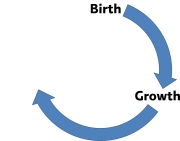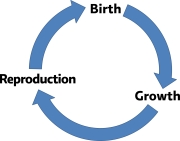Six years ago one of America’s most influential churches, Willow Creek Community Church, conducted a ministry self-assessment to determine which of its programs were producing disciples of Jesus. Willow’s leadership works from a business model, treating church-goers as customers. They believed that participation in church programs would make attenders into disciples of Jesus. But they discovered that rather than making growing, reproducing disciples, the programs mostly recycled church consumers.
Sadly, the picture is much the same in most evangelical and fundamentalist churches. A recent survey of American church-goers by Lifeway Research confirmed what previous studies have found: fewer than 20% of Christians evangelize the lost. Even fewer are personally and regularly training other disciples. Maybe saddest of all, our children are receiving the impression that this is normal Christianity because they have so few models who are making disciples of Jesus.
Discipling as a department of the church?
Either intentionally or incidentally, most churches follow a business oriented model. Discipleship has become one of several departments to be managed. “Missions” is treated as a program by which evangelism is subcontracted to people called “missionaries,” or to a few within the church who are assumed to be gifted in evangelism. Training is relegated mostly to a few assumed to be gifted in teaching.
Treating disciple-making as a department in the church tends to suck the passion out of disciple life. Even more importantly, it undervalues the present work of the Holy Spirit by substituting what we can do in place of His supernatural power. Our understanding of disciple life needs to shift to thinking about . . .
Disciple-making as a life cycle.
Consider this: every one of us who are followers of Jesus today came to Him because twelve men trained by Him carried out His mission. That mission was to make disciples (Matthew 28:19). That’s Jesus’ mission for every one of His followers. That’s why church exists. Based on that command, anchored in passages such as Mark 3:13-15 and Luke 10:1-12, and modeled by second-generation disciples such as Philip and Stephen in Acts 6-8, disciple-making can be thought of as a life cycle, beginning with . . .
Birth–Being introduced to new life in Jesus.
The new birth is the essential change that  begins disciple life. But it is not the destination. As a friend of mine has observed, even heaven is not the destination. Experiential relationship with the living God is the destination! The Bible norm is that Jesus’ followers introduce others to Him by evangelizing, which should lead to . . .
begins disciple life. But it is not the destination. As a friend of mine has observed, even heaven is not the destination. Experiential relationship with the living God is the destination! The Bible norm is that Jesus’ followers introduce others to Him by evangelizing, which should lead to . . .
Growth–-receiving the instruction, the resources and the model for loving, serving and ministering as Jesus does.
Francis Chan has pointed out, “For a person to be truly discipled and growing in his faith, he needs more than one person discipling him.” That is why we need a higher view of church and a deeper understanding of fellowship. Disciple-making thrives in community.
In John 15, Jesus taught us that only as His word abides in us will we experience growth. So disciple life also requires personal, thoughtful and vigorous engagement with Scripture in order to thrive. Everything else we do as disciples flows from how we read Scripture.
So disciple life also requires personal, thoughtful and vigorous engagement with Scripture in order to thrive. Everything else we do as disciples flows from how we read Scripture.
This is the critical step where the cycle most often breaks down. Often I hear people speak of how good this or that Bible teacher is. I think they mean that the teacher is skilled at noticing and communicating insights and truths that other people miss. We all appreciate that. But by itself, that kind of teaching is little more than information transferral, and usually does not make disciples who make more disciples. I suggest that a good teacher is one who equips other disciples to do what he is doing, including teaching them how to dig the rich treasure from Scripture, so that they can do the same for other disciples.
Reproduction— . . . all of which they in turn do for others.
This cycle is continued with more evangelism and teaching, but not just any kind . The essence of disciple-making, the passion that drives it, is to show others that Jesus is the treasure. Cultivating zeal for Jesus as the treasure does not happen because we talk about it. It takes place when we move the focus away from programs. Instead we must give personal, vigorous attention to the words of God, and the properly value the present supernatural work of the Holy Spirit.
. The essence of disciple-making, the passion that drives it, is to show others that Jesus is the treasure. Cultivating zeal for Jesus as the treasure does not happen because we talk about it. It takes place when we move the focus away from programs. Instead we must give personal, vigorous attention to the words of God, and the properly value the present supernatural work of the Holy Spirit.
If maintaining church programs is the focus, then the mission becomes optional—an option that the majority of church-goers do not choose. It is easier to merely be in an assembly that “supports missions” than to engage our neighbor with the Gospel. Offering “a few encouraging words” on Sunday morning becomes a convenient substitute for doing the hard work of investing our lives to teach others.
Jesus is still busy making disciples. His work will go forward with or without us. But He has made us His own so that we will join in what He is doing. This is our opportunity.

I have been involved in three different churches in my lifetime, one of them twice now. For me, the underlying problem seems to be within the congregation itself. Too many are judgemental, the same people seem to want to run the church. And lastly for me, the more I get involved and the more I do, the less recognition I get, while others get it all (recognition).
Church, afterall, is a “volunteer” thing. If you expect people to volunteer, then recognize them equally, not just the same ones all the time. How do you expect people to stay involved and to participate and do the work if you don’t recognize them for it??? I am about to leave the church now for the fourth and last time. I can do more constructive things on my own without those in the church clamoring for the “top of the heap” all the time. When you continually give of your time and efforts and receive no recognition, it becomes usury and hurtful.
Our church does a community meal each week, and yesterday, Compassion Sunday, the pastor recognized many who volunteer for this worthwhile mission by name, but I felt left out, as mine was not, and I am continually asked to fill this position or fill that position. People need to feel like they actually belong, with what I am getting, I feel like I don’t fit in at all, I am just being used!!
LikeLike
I am replying to my own post here. One other thing that strikes me as wrong I guess is how you could put it, is the fact that in going back to this last church for the 2nd time now, there was a remark made in a class I participated in.
During the discussion in the class, someone brought up some family who had left the church, and the discussion leader, who is one of those that tries to run everything, stated, “oh well, that was their choice, we need to just forget about them and move on.” I do not think that is what Jesus would say. If my heart is right, his response would be to find out “why” those people were leaving the church. Our role as I see it, is to help one another, not nit-pick and drive folks away from the church. If you’re going to church to “put on a show” as a performer in the choir or to try to run everything, there are lodges and fraternal organizations for that. The church should be a place of worship and not of those who want to run it all.
LikeLike
Jim,
The thinking behind the comment you quoted is a problem. The person making that statement appears to lack an understanding of the local gathering as community, in which we “one another” as a way of life. Yes, some do make choices to leave, and that should be respected. The goal should not be to amass the highest number of church attenders. But I strongly agree with your view that we should be finding out why people leave. We should not assume that their reasons are always unworthy. We might find that there is something lacking in our “one anothering.”
On the subject of “church as a performance event,” you are quite right. Please see the good comment by Heartspeak below, and my reply to him.
Regarding your current church situation, I will suggest two questions. First, does the church leadership teach and practice spiritual gifting, as taught in Scripture? Is your church moving toward a Biblical understanding of how the Spirit supernaturally expresses Himself with gifts to build up the body of believers? If not, then present that need to them. Otherwise, church becomes merely a place where members function as free labor to maintain quasi-religious programs. For more on this, please read my posts, (listed above), “Jesus’ Miracles and Spiritual Gifts,” and an older one, “The Unused Spiritual Gifts,” at https://activefaith.wordpress.com/2013/09/26/the-unopened-gifts/
Second, ask yourself this question: Am I serving in this church because the Father has told me to do what I do and the Spirit has supernaturally gifted me to do that work, or am I doing it for some other reason? I am not implying that it’s wrong to be recognized for what one does. A church that chronically fails to appreciate its members contributions is a poor church. But I am suggesting that it matters why we serve.
Does that help? Have more to say? Let me know!
LikeLike
Churches today have changed so much since I was a young person. They are a lot more formal now. We have one man each service that says “Amen” real loud and you can hear a pin drop. Maybe we need another Billy Graham or Phil Shuler to loosen our formality. Sometimes I just want to stand up and raise my hands to God but that would just bring stares.
LikeLike
I have so many thoughts on this, my passion, for the Church and my grief for her sad state of affairs in the West ( I know not the state of the church in the East).
I believe one of the core issues is that for far too long, we have focused on making converts and attenders— not on making Disciples, Followers of the Master.
When you look at the emphasis of time, resources, salaries and effort, it is apparent that our priority is on the production of the Sunday Event and the programs that attract enough folks to help support and maintain our Sunday Event. Very little effort has been made in calling the unsaved to Discipleship. Yes, evangelism is sometimes a component of what a church does, or more accurately, suggests folks should do. But at best, it’s a very small component budget and time wise. Even when it is a serious part, it’s still to make converts– and usually to let the local church do the rest of that, you know, discipleship / growing thing.
If the local church focused on the calling, equipping of the saint each week instead of providing 4 or 5 songs and a quaint homily known as the Sermon (Preaching the Word) then things would be different. We have also forgotten that preaching the word is far more than a certain type of oratorical speaking that few folks related to and even fewer learn from. As St Augustine said, (loose quote) Always preach the Word, use words if you must. We in the church seem to believe that with many words, all will be well and we now worship the form, not the Master.
(Discuss)
LikeLike
Heartspeak,
I agree with everything you wrote. Your characterization of church services as a “Sunday Event” is quite apt and all too common, I’m sorry to say. And you captured a big part of the problem in pointing to, “we have focused on making converts and attenders— not on making Disciples, Followers of the Master.” I would follow that with a question: how did we slip into that habit?
I don’t pretend to know all the reasons, and there’s certainly not room to explore them all here. But I do believe that there are three reasons that look very much like root problems to me. First, there is almost universal acceptance of an unbiblical and truncated view of what disciple-making is. That’s what I tried to address in a small way in this post. The other reasons are two common but unhealthy tendencies. One is to undervalue what the Word of God says, hence my urging for a different kind of teaching. The other is an under-appreciation of the present work of the Holy Spirit. I plan to address that in an upcoming post.
Jesus said everyone, when fully trained will be like his teacher. There is a such a great need for people who are actively modeling disciple-making. Without that need being filled, we will continue to become non-disciple makers because that is the kind of model we see. I am thankful that my church is moving toward being a true disciple-making church. I plan to stay in and be a part of that good change. Speaking only for myself, if I cannot model disciple-making for others in my church, then I am a big fat waste of space.
LikeLike